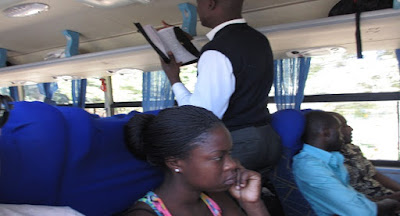Respecting Public Space and Religious Preaching: The Need to Desist From Religious Preaching on Public Buses.
By S. T. Adam, Esq.
In a diverse and multicultural society like Nigeria, it is vital to promote religious tolerance and respect for all individuals’ beliefs. While religious freedom is a fundamental right as contained in Chapter 4 of the 1999 Constitution (as amended), there are certain settings where it’s necessary to strike a balance between personal expression and respecting public space. My aim here is to shed light on the potential drawbacks of Christian preaching on public buses in Nigeria, and why it might be more appropriate to desist from such activities.
1. Public buses are considered communal spaces where people from different backgrounds and faiths come together to commute. Using this platform for religious preaching, (as Christians do) could alienate and discomfort passengers who do not share the same beliefs. It’s essential to know and maintain that buses are not made for any religious preaching unless they belong to religious organizations. We should always try to create an environment (whenever we are in a public space) where everyone feels welcomed and comfortable, irrespective of their religious affiliations.
2. Personal beliefs and faith are subjective matters that should be respected. By engaging in unsolicited religious preaching on public transport, individuals may inadvertently invade the personal space and privacy of fellow passengers (just imagine someone standing in front of you and talking on top of his/her voice saying what you have zero interest in. It is so annoying). Many commuters seek peaceful journeys to reflect or engage in personal activities during their commute, and constant religious communication may disrupt this tranquility.
3. Religious diversity in Nigeria might either be one of our most significant assets or a hassle, depending on how we engage and tolerate each other. Surely, the intentions behind religious preaching on public buses may be positive, but it carries the potential to lead to conflicts, disagreements, and even proselytization ( though we all have a right to change our religion). Agreeably, desisting from such religious preaching can help maintain a harmonious environment, reducing the chances of disputes or unnecessary tension among passengers.
4. I believe many will agree with me that Christians may have concerns and they’ll be all over calling for a stop if the scenario were reversed, and Muslims were conducting religious preaching on public buses (I have never seen Muslims doing such on public buses). The Nigerian Christians that I know would argue and protest that it goes against the principles of religious neutrality and may feel uncomfortable or even offended by such practices. These potential reactions highlight the importance of considering both sides of the issue and focusing on promoting a fair and peaceful approach that respects the rights and sensibilities of all religious groups within the society. It is essential to uphold a balanced and consistent approach to religious expression in public spaces, ensuring that no particular group is given preferential treatment while also safeguarding the well-being and comfort of all citizens.
5. Nigeria is a secular nation as provided in section 10 of the 1999 Constitution (as amended), which means that religious activity should ideally be conducted within designated places of worship or private venues.
Finally, it’s crucial to foster a peaceful and tolerant society that values diversity and respects the boundaries of public space. While freedom of religion is essential, we must also consider the rights of others and the importance of maintaining a peaceful coexistence. Let’s collectively create a more harmonious environment, promoting a more unbiased and secular environment that respects the rights of all citizens. Do not do unto people what you don’t want people to do unto you.
****************************************************************************************
This work is published under the free legal awareness project of Sabi Law Foundation (www.SabiLaw.org) funded by the law firm of Bezaleel Chambers International (www.BezaleelChambers.com). The writer was not paid or charged any publishing fee. You too can support the legal awareness projects and programs of Sabi Law Foundation by donating to us. Donate here and get our unique appreciation certificate or memento.
DISCLAIMER:
This publication is not a piece of legal advice. The opinion expressed in this publication is that of the author(s) and not necessarily the opinion of our organisation, staff and partners.
PROJECTS:
🛒 Take short courses, get samples/precedents and learn your rights at www.SabiLaw.org
🎯 Publish your legal articles for FREE by sending to: eve@sabilaw.org
🎁 Receive our free Daily Law Tips & other publications via our website and social media accounts or join our free whatsapp group: Daily Law Tips Group 6
KEEP IN TOUCH:
Get updates on all the free legal awareness projects of Sabi Law (#SabiLaw) and its partners, via:
YouTube: SabiLaw
Twitter: @Sabi_Law
Facebook page: SabiLaw
Instagram: @SabiLaw.org_
WhatsApp Group: Free Daily Law Tips Group 6
Telegram Group: Free Daily Law Tips Group
Facebook group: SabiLaw
Email: lisa@sabilaw.org
Website: www.SabiLaw.org
ABOUT US & OUR PARTNERS:
This publication is the initiative of the Sabi Law Foundation (www.SabiLaw.org) funded by the law firm of Bezaleel Chambers International (www.BezaleelChambers.com). Sabi Law Foundation is a Not-For-Profit and Non-Governmental Legal Awareness Organization based in Nigeria. It is the first of its kind and has been promoting free legal awareness since 2010.
DONATION & SPONSORSHIP:
As a registered not-for-profit and non-governmental organisation, Sabi Law Foundation relies on donations and sponsorships to promote free legal awareness across Nigeria and the world. With a vast followership across the globe, your donations will assist us to increase legal awareness, improve access to justice, reduce common legal disputes and crimes in Nigeria. Make your donations to us here or contact us for sponsorship and partnership, via: lisa@SabiLaw.org or +234 903 913 1200.
**********************************************************************************




















































